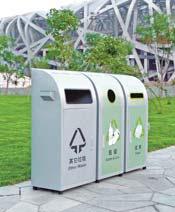A draft regulation from Beijing Municipal Government's law office, which threatens to fine individuals between 20 and 200 yuan, and companies and organizations 5,000 to 50,000 yuan, if they fail to sort garbage, is proving unpopular with some citizens.
 Garbage sorting dustbins at the Olympic Green. [Photo/China Daily]
Garbage sorting dustbins at the Olympic Green. [Photo/China Daily] "Reward is a better option than punishment," said a netizen, who identified himself as Yang Mingxi, on the comment page of the law office's website.
The city government started collecting public input into the proposed regulation on Friday.
Beijing plans to see three-fourths of its 4,000 or so communities enter a new phase of environmentally friendly trash sorting by the end of 2010. Without proper recycling, the city's garbage will pose an ever-greater problem, experts say.
According to statistics, the city produces more than 18,000 tons of trash every day, which, in 7-meter-long trucks, nose-to-tail, would make a complete circle around the Third Ring Road.
While classified trash bins have been installed in most local residential compounds and sorting went well in pilot communities, in other areas, some citizens still seem to lack an awareness of sorting waste, let alone know how to do it.
"There is not enough training to instruct us what kind of wastes can be recycled and how to classify them," said a woman in her 40s, surnamed Qi, who lives in the Huixinnanli community.
"The recycling trash bins are just for show. I've never seen anyone use them seriously," she added.
A woman surnamed Wu, manager of the property management company in the Huixinnanli community, told METRO they are powerless to get residents into the habit of classifying rubbish.
"We are not entitled to enforce any punishments against those who do not cooperate, and even if we were, there are no specific standards for imposing fines. So to sort or not, is still largely a matter of personal choice," said Wu.
Feng Yongfeng, a researcher at the Beijing-based environmental protection organization Da'erwen, said promoting separate trash collection using fines and rewards is worth a try.
An existing Beijing government incentive calls for communities to be rewarded for the effective management of waste.
Feng suggested starting by applying international approaches, collecting certain types of trash on each day of the week.
"For example, paper is collected only on Mondays, and glass on Tuesdays," said Feng. "That way, residents know what to dispose of each day."
He said this approach could also ease some residents' concerns about trash being mixed together again by collectors.
Feng is dissatisfied with the ongoing trash separation experiment that has lasted for almost a year, saying some communities are still only putting up notices.
"I hope solid work will be done next year."
Still, there are some young people who are eager to embrace the recycling idea and give their suggestions.
"Worthy or not, this has become my habit. I do what I can to protect our environment," said Li Xiaoyun, 28, who studied in the UK and who now works for an advertising company in Beijing.





